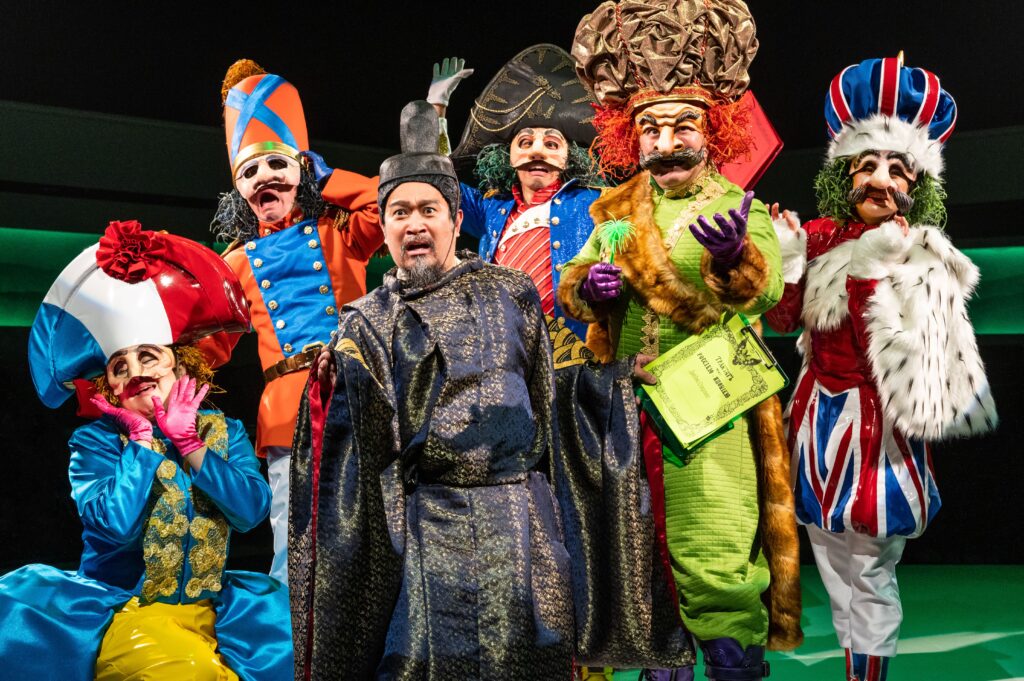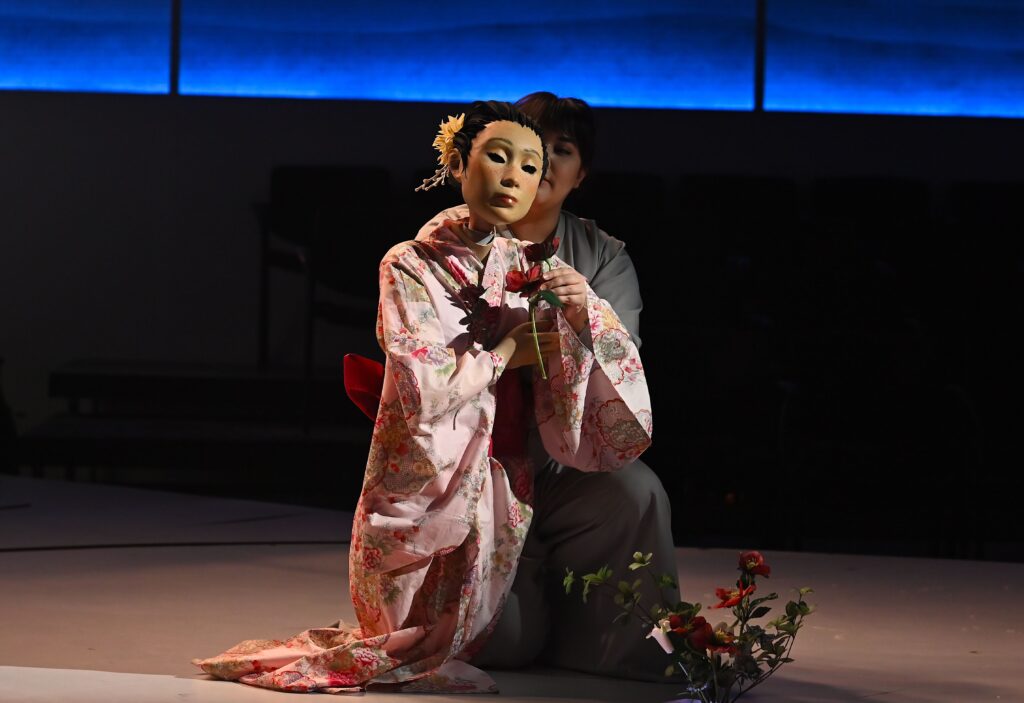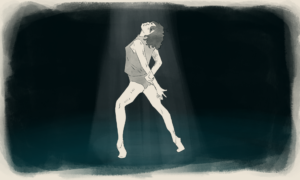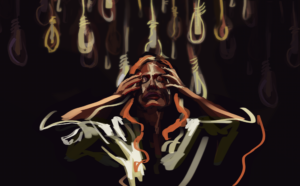Content warning: This article includes references to sexual harassment.
An exploration of Western imperialism and influence in 19th century Japan, Signature Theatre’s production of Stephen Sondheim’s Pacific Overtures handles its complex subject matter sensitively, but never with kid gloves. Education and entertainment seamlessly blend with formidable vocals, intricate mise-en-scène, and rich symbolism to recount Japanese history. Spearheaded by an incredibly talented, all-Asian American cast and directorial team—with Ethan Heard and Alexander Tom as director and musical director respectively—Pacific Overtures is a mesmerizing two hours and 20 minutes; the show moves like honey, naturally sweetened by the cast’s tender, vulnerable performances.
This musical, running until April 7, is the latest production in “So Many Possibilities: A Season of Sondheim,” Signature’s tribute to the work of the late, great musical theater composer whom the company lovingly refers to as “Signature’s signature.” While often underappreciated in comparison to more commercially successful titles in his oeuvre such as Into the Woods and West Side Story, Pacific Overtures is brilliant, blending Japanese theatrical tradition with Sondheim’s hallmark style to create something truly unique. Sondheim even often claimed “Someone in a Tree,” the Act 1 finale, as his favorite song he ever wrote.
Pacific Overtures depicts the forced end of Japan’s 250-year-long period of international isolationism, thrust upon them by the arrival of American naval officer Commodore Matthew C. Perry (Nicholas Yenson) and his four warships in Uraga on July 8, 1853. The title refers both to geography and, as the Reciter (Jason Ma) explains, an ironic line from Perry’s 1853 letter to the Japanese emperor requesting an acceptance of the Americans’ “pacific overtures,” implying a peaceful arrival. This egregious statement prompts the Reciter to lower his glasses and flash the audience a knowing look.
Though rooted in serious discussions of imperialism, class tensions, and the rise of materialism in Japan, Pacific Overtures delicately oscillates between weightier and jovial moments with incredible tact, always remaining conscious of the subject matter at the musical’s core while also giving the audience space to exhale. Juggling these two polar opposite tones is a challenge, yet Signature’s production rises to it masterfully.

Courtesy of Signature Marketing Eymard Meneses Cabling (Lord Abe) and the cast of Pacific Overtures.Courtesy of Signature Marketing
The beginning is slow and methodical, with opening numbers “The Advantages of Floating in the Middle of the Sea” and “There is No Other Way” taking time to familiarize the audience with a more leisurely, introspective pace. However, things roar to life with the number “Four Black Dragons,” featuring anecdotal recollections regarding the arrival of Perry’s “black ships” from citizens of Uraga. Ensemble member Chani Wereley’s voice particularly shines here, her belted notes knocking the wind out of the audience with the force of a thunderous hurricane.
This heightened energy continues in the humorous yet twisted “Chrysanthemum Tea.” Clad in a flowing, floral green kimono, Andrew Cristi portrays the shogun’s mother who mercilessly nags her bedridden son to handle the American warships looming on the shoreline. Ironically, this lively number details the shogun’s pitiful demise—turns out his delightfully devious mother was slipping a bit more than motherly love into his bedside brew. Like “Welcome to Kanagawa” later on in the first act, “Chrysanthemum Tea” enlists a non-female performer to portray a female role in line with the Japanese kabuki theatrical tradition.
Sprinkled between these two vivacious group numbers is the waltzing “Poems,” a piece where samurai Kayama (Daniel May) and fisherman Manjiro (Jonny Lee Jr.) bond despite their differing class positions and perspectives on the West by swapping lyrical pleasantries and tossing an orange back and forth. From the dispersion of cherry blossom petals and the flying of paper kites in the crowd to the clever utilization of the spinning central platform to simulate the movement of a long casual stroll on a small stage, Heard’s directorial choices harmoniously create a blissful afternoon ambience. While serenity is sparse in this musical about change, the calm provides the fertile ground necessary for this important dynamic to bloom.
The peaceful atmosphere created by “Poems” and “Someone in a Tree” is shattered in the first act’s chilling final scene. Following a conference in which America agrees not to infringe upon Japanese soil, the lights go dark momentarily before flashing on Perry’s glossy black gold-buckled gladiator boots stepping, without permission, on Japanese land untouched by foreign feet for over 250 years. Sporting an Uncle Sam hat, matted and mossy lime green hair, and a protruding potbelly, Perry stomps over to a square patch of sand in the center of the stage and roughly seizes the granules in his hand, starkly contrasting the Reciter’s careful caressing of the sand in the first scene. The act ends with a cascade of spotlighted sand filtering through Perry’s tangerine-gloved fingers as the taiko drum beats menacingly. Awash in red light, the moment foreshadows the violent conflict to come as a result of this (over)step, both between Japan and the European imperial powers and among Japanese citizens with conflicting sentiments towards the West.
The second act examines Western infringements on Japanese life through “Please, Hello!” and “A Bowler Hat.” The former is a deeply satirical number in which over-the-top caricatures of imperial powers such as the U.S., England, the Netherlands, France, and Russia present long lists of demands to the shogun. As they titter around and mark their newly claimed territory with their flags—both placed on the ground and passed out to audience members—frightening cannon fire rattles offstage.
Though much of the critique is comedic, Pacific Overtures doesn’t shy away from denouncing Western imperialism more blatantly. Look no further than “Pretty Lady,” in which three American sailors make horrific, unwanted sexual advances towards a young Japanese girl, who is represented by a puppet. The choice to use a puppet here is an impactful one, illuminating that these vile men do not see her as human. While Wereley is a commanding force in earlier numbers, as the girl’s puppeteer, she is vulnerable and petrified, emotions communicated wordlessly through her facial expressions and delicate puppetry.

Courtesy of Signature Marketing Chani Wereley in Pacific Overtures.Courtesy of Signature Marketing
Unfortunately, Pacific Overtures concludes with an unnecessarily bleak flash-forward to Japan today, complete with selfie-stick-clutching Gen-Zers, materialistic tourists, and mentions of high pollution, leaving a convoluted message about Japan’s present and future. Nevertheless, it would take much more than this odd, ambiguous ending to tarnish Pacific Overtures’ luminescence; these are two and a half hours of richly textured historical drama which celebrate Japanese performance tradition you won’t want to miss.
This article was updated on March 28 to correctly credit Jonny Lee Jr. in the role of Manjiro, which had originally been credited as understudy Alex Koichi Beard.





